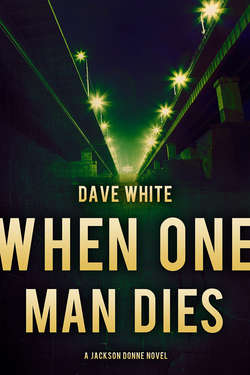Читать книгу When One Man Dies - Dave White - Страница 23
На сайте Литреса книга снята с продажи.
ОглавлениеChapter 15
Brushing the rain off my shoulders and running my hand through my soaked hair, I followed Tracy into Rinaldi’s Funeral Home. The lobby was carpeted in red, and the wallpaper was mute beige. A few thick easy chairs, also dark, more a maroon, contrasted with the carpet. Perfect for a wake. A bronze coffee table sat across from the chairs, a few magazines resting on it. The lobby was clean and smelled antiseptic, a cross between lime and bleach, a scent I hadn’t experienced in a while.
A short heavy man in a black double-breasted suit stepped out of a room I assumed was his office. To his right was a larger room where they held the actual wakes. The man’s face was pale, except for deep red cheeks. He had dark hair slicked back. His clothes were neatly pressed, and his loafers reflected the artificial light from above. He smiled at Tracy.
“Ms. Boland, I assume?” He reached his hand out in her direction, taking hers and pumping it twice. He looked at me. “And you are?”
Tracy introduced me.
He took my hand loosely and shook it. “Mr. Donne. I am John Fleming, the funeral director.”
“Nice to meet you.”
“Ah,” he said, looking at his watch. “I wish it was under better circumstances. You are about ten minutes late, Ms. Boland. I was beginning to worry.” He tugged at his lapels, then brushed a piece of lint off his shoulder. “If you’d like to get started, we can go to my office.”
Fleming turned on his heels and stepped through his office door. Tracy turned my way.
“If you don’t mind, I’d like to handle this on my own.”
Tracy disappeared into Fleming’s office, the door swinging shut behind her. I took a few steps around the lobby and peeked into the funeral room. There wasn’t a body or even a casket inside, but the room was set up with flowers and about ten rows of seats.
I walked around, the antiseptic smell growing stronger. The room’s colors were the same as the lobby, same carpet, same walls. The chairs were maroon as well, though they were more like folding chairs than easy chairs. I stepped up to the small lift where the body would be kept, trying not to picture Gerry’s body in a morgue; instead, trying to picture him lying at rest in a coffin tomorrow.
I never understood wakes, which were apparently for the living. Why keep a corpse, open casket, made up to look like some cheap plastic imitation of your loved one, lying at rest for four hours?
People came in and out, offered fake condolences for a while and said prayers, then left, hitting the local bar. It didn’t do anything for me.
The antiseptic smell was unique to funeral homes, and it brought back the memory of Jeanne’s wake. When Jeanne died, just two weeks after I had gotten out of rehab and six months before we were to be married, I wanted nothing to do with a wake. She had been cut down by a drunk driver as she drove herself home from a get-together with work friends. The driver had crossed the double yellow lines and smashed into her front fender, forcing her car off the road. By the time the fire department used the Jaws of Life, she was long dead. Her parents insisted I show at the wake and funeral, saying it would do me good to see her, to know how much her friends and relatives cared about her. I agreed.
